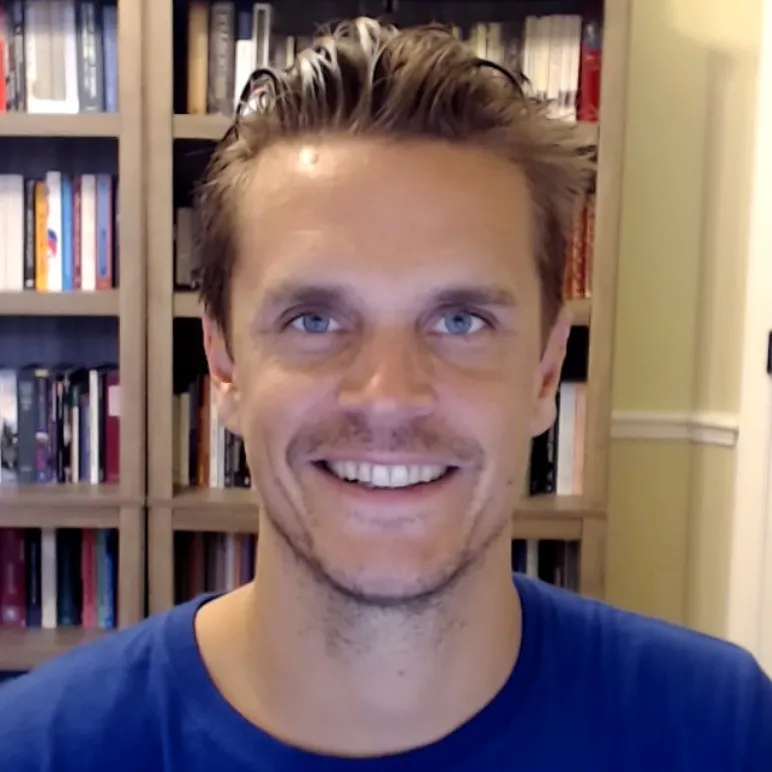.avif)
7 Things Career Expert Ken Coleman Says Parents Get Wrong (And How to Fix Them)
7 Things Career Expert Ken Coleman Says Parents Get Wrong (And How to Fix Them)
7 Things Career Expert Ken Coleman Says Parents Get Wrong (And How to Fix Them)
I recently sat down with Ken Coleman, bestselling author and host of Front Row Seat with Ken Coleman, who's helped thousands discover what he calls "work you're wired to do." He's not your typical talking head pundit - Ken left his own successful sports broadcasting career to help others find their path. After nearly a decade at Ramsey Solutions, he's seen how the job market has evolved in ways most parents haven't caught up with yet.
Ken's book, Find the Work You're Wired to Do, now has a student edition that is essential reading for every parent in OpenEd. His framework centers on what he calls our "three wires" - talent (what we do best), passion (what we love to do), and mission (the results we care about). The book includes his Get Clear Career Assessment that takes just 10-15 minutes and gives you a personalized roadmap for your child's unique wiring.
Our conversation dug into the principles that make this book so powerful.
Fair warning: this conversation will challenge much of what you think you know. (Number 4 on this list literally made me cringe when I realized what I'd been doing to my own kids.)
Here are the seven biggest mistakes Ken sees parents making - and his counterintuitive solutions.
1. We're obsessed with raising "well-rounded" kids
Ken didn't mince words: "I'm so sick of hearing this. I want a well-rounded kid, not me, not me. I don't want a well-rounded kid."
"Nobody goes to Lowe's or Home Depot and walks in and goes, I want a well-rounded sander. I want a well-rounded blade... anything that does really good work and that is efficient has an edge to it."
Think about it - when was the last time you hired someone because they were mediocre at everything? The world rewards specialists, not generalists. Yet we push our kids to bring up their C in math while their natural gift for writing goes undeveloped.
What to do instead: Focus on sharpening your child's natural edges. Ken's assessment identifies your top talents - those things you naturally do better than others. Stop spreading effort thin across weaknesses. Develop their strengths into something exceptional.
2. We spend too much time fixing weaknesses
"I can work my tail off if I'm a three in something on a scale of one to 10. And if I bust my butt, I might be a five," says Ken. "But I can tell you this. The world doesn't pay for fives. The world pays for nines and tens."
When Ken's kids bring home a C, he focuses on one thing: effort.
"If they did a pretty good job and their effort was there and they just, the best they could do is a C, guess what we do at our house? Nice job. You're never going to do that after school. No one's ever going to pay you to do that kind of stuff. In fact, you're going to pay somebody else to do that."
What to do instead: Check for effort, not grades. A 'C' with genuine effort in a weak area is fine. An 'A' without effort in a strength area needs attention. The assessment helps identify exactly which talents deserve development time - what Ken calls your "wow factors."
3. We dismiss kids' career dreams as fantasy
This story broke my heart. A 27-year-old woman called Ken's show, miserable in her job: "When I told my mom and dad that I wanted to work with horses, my dad said to me, you'll never make any money doing that and you'll struggle your whole life."
She started crying on air. "I love my dad. He's a good dad. I don't think he meant anything by it, but he crushed my..."
Ken's warning was sobering:
"If we're not careful, we squash our kid's heart."
He also cited research showing many successful adults in their 20s and 30s returned to career ideas they'd had at ages 9 or 10. That childhood intuition about what lights them up? It's often more accurate than we think.
What to do instead: When your 8-year-old mentions a career interest, lean in with curiosity, not caution. Use Ken's framework: Does it align with their talents? Does it involve work they're passionate about? Does it produce results they care about? The assessment helps you have this conversation with data, not just dreams.
4. We project our own regrets onto our kids
This question made me say "Oof" out loud during our conversation:
"Does my opinion, my belief or my desire for them have anything to do with regrets in my own life?"
Ken didn't let up: "I know it's dark. But I do think you have to have that context because you've got to check yourself and you have to realize how much influence you have on your kid."
My mom STILL mentions that I should have learned small engine repair, something she randomly associated with being a "useful man." I do work I love, and can afford to pay someone to fix my lawnmowever when it breaks. But she holds onto this vision from 30 years ago.
What to do instead: Before every career conversation, ask yourself Ken's hard question. Write it down if you have to. The assessment gives objective data about your child's actual talents and passions, helping separate their potential from your projections.
5. We think degrees guarantee success
"They don't care where you went to school," Ken said bluntly. "They do not care. Nobody cares."
He explained the shift:
"More and more we're seeing in corporate America specifically that young people are coming out of college and they're not really trained well for these jobs... A lot of companies are going, we'll train you. If you've got the talent and the skill, we'll train you and hone you."
What employers actually want? "They're looking for potential. They're looking for high character."
What to do instead: Focus on building character traits that actually matter. Ken highlighted two critical ones: coachability (can you take instruction AND correction?) and adaptability (can you handle change without melting down?). These soft skills matter infinitely more than the name on a diploma.
6. We protect kids from financial failure
Ken's son came home broke after freshman year: "Guess who's got a real strong work ethic this summer. Him, you know why? Cause he's broke. And outside of his meal plan, I didn't send him any money."
His philosophy challenges our protective instincts:
"Let them fail. Let them learn how to handle money and fail with money so that when I come in and give a little advice, it's actually applicable and appreciated because they feel pain."
Ken anticipates his son will eventually call about unpaid bills: "He's not going to go to debtor's prison. He's not going to ruin his life if he misses a couple of bills. That's when you grow up."
What to do instead: Allow safe financial failures while stakes are low. Know each child's natural money personality (Ken has one extreme saver who's "becoming manipulative" and one carefree spender). Guide based on their wiring, not generic Dave Ramsey steps that ignore personality.
7. We use a one-size-fits-all approach
Ken's bike-riding analogy perfectly captures what we miss:
"Think back, if you have multiple kids, how you taught each of the individual kids to ride a bike. It was different... However you did that, that's your guide on any subject with any of your kids as they get older."
We instinctively know our kids are different when teaching them to ride bikes, swim, or tie shoes. Yet somehow when it comes to education and career prep, we default to the same approach for everyone.
Ken's framework reveals why this fails. Every human has three distinct wires: talent (what you do best), passion (what you love to do), and mission (results you care about). Your hyperactive builder kid and your quiet bookworm have completely different wiring - why would we prepare them for life the same way?
What to do instead: Use Ken's Get Clear Career Assessment with each of your kids individually. The assessment provides a personalized purpose statement that brings together their unique combination of talents, passions, and mission.
The Bottom Line
Even the smartest parents are often optimizing for the wrong things. We push our kids to patch up their weaknesses while their strengths atrophy. We tell them to be practical when they dream. We project our own failures onto their futures.
The world doesn't need more well-rounded people who can do everything adequately. It needs people with sharp edges - people who know their talents and have the courage to develop them into something exceptional. People who understand that busting your butt to become merely average in something is a tragic waste of the gifts you were given.
Ken's formula is deceptively simple: Use what you do best to do work you love to produce results that matter. That's not just a career strategy. It's a parenting philosophy that honors who your kids actually are instead of who you think they should be.
Ready to discover what your child is actually wired for? Get Ken's book Find the Work You're Wired to Do with the included assessment. At just 10-15 minutes, it's the smallest investment you'll make with the biggest potential return - helping your kid find work that doesn't feel like work.
Your kid deserves to know what they're wired for. And frankly, so do you.
Subscribe to The OpenEd Daily
Join 20,000+ families receiving curated content to support personalized learning, every school day.
.webp)



%20(1).png)
.png)
.png)